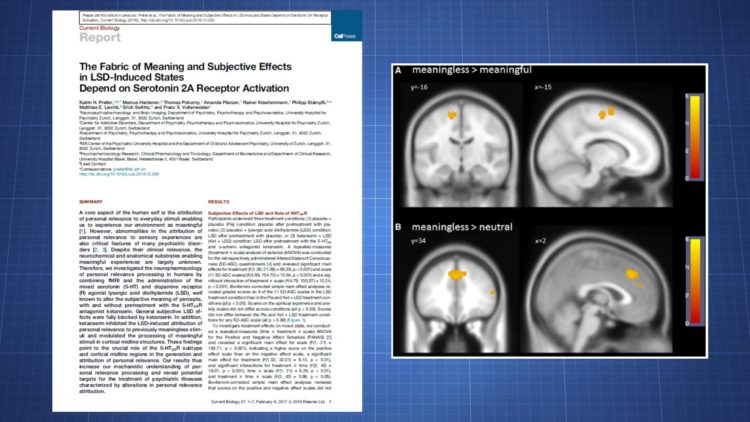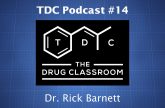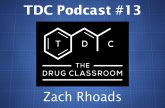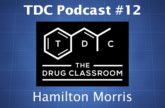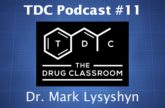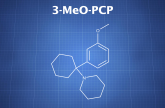Abstract: LSD administration can significantly affect self-related processing in the brain. This was shown by an increase in “meaning” scores for otherwise meaningless music. The effects were correlated with changes in brain regions known to be associated with self-related activity. Most of the effects were blocked by a 5-HT2A antagonist, ketanserin.
Authors: Katrin H. Preller, Marcus Herdener, Thomas Pokorny, Amanda Planzer, Rainer Kraehenmann, Philipp Stämpfli, Matthias E. Liechti, Erich Seifritz, and Franz X. Vollenweider
DOI: 10.1016/j.cub.2016.12.030
Link: http://www.cell.com/current-biology/abstract/S0960-9822(16)31510-X
Published: January 2017
Background
One of the key parts of human life is attaching meaning to internal and external stimuli. This same process can be disrupted in some psychiatric conditions.
In the case of psychiatric illness, abnormal attribution of personal relevance to stimuli can be problematic. This has been seen in schizophrenia and possibly in addiction, phobia, and mood disorders.
Even though there is clinical relevance in the meaning attribution process, the neurochemical and anatomical correlates of that activity haven’t been fully elucidated.
Music is a useful tool when researching this topic since it is effective at eliciting self-related processing.
Evidence shows cortical midline structures, including the supplementary motor area (SMA), dorsomedial prefrontal cortex (dmPFC), and lateral prefrontal cortex (lateral PFC) are involved in self-referential cognition and self-relevant processing.
The ventrolateral prefrontal cortex (VLPFC) has been associated with aberrant self-reflectiveness in schizophrenia.
Protocol
A few tools were used in the study:
- Pharmacological (LSD and ketanserin)
- fMRI (BOLD)
- Questionnaires for subjective effects
- Particularly subjective activity associated with music.
The research was conducted in a double-blind, randomized, crossover manner. Three conditions were performed on three occasions, all separated by 2 weeks.
Conditions
- Placebo followed by placebo
- Placebo followed by LSD (100 ug)
- Ketanserin (40 mg) followed by LSD (100 ug)
22 participants (17 males, 5 females) were recruited via ads at local universities. Six of the 22 had prior experience with hallucinogens, but that experience wasn’t associated with interactions on the subjective measures.
Minimal negative effects were reported after the test period. Four reported transient headache and one reported sleep disturbances for two nights following drug administration. No significant effects were reported right after the tests or at a 3-month follow-up.
In all of the conditions, the pretreatment (placebo or ketanserin) was given 60 minutes prior to LSD. The fMRI/music test was conducted 100 minutes after LSD or placebo administration.
To investigate the impact on personal relevance, music was used. Participants provided songs they considered meaningful and they were also given neutral and meaningless tracks.
Results
General subjective effects
LSD led to greater scores on 9 out of 11 measures on the 5D-ASC questionnaire relative to placebo and ketanserin+LSD.
- Impact: experience of unity, blissful state, insightfulness, disembodiment, impaired control and cognition, complex imagery, elementary imagery, audio-visual synesthesia, and changed meaning of percepts.
- No significant impact: spiritual experience and anxiety.
The ketanserin+LSD condition didn’t differ from placebo for any parts of the 5D-ASC.
LSD’s lack of effect of spiritual experiences differed from a prior study involving 200 ug. This could have been due to the dose and the clinical environment. Participants in the trial also had lower average scores on a personality scale looking at spirituality.
Mood
The positive affect scale was significantly greater with LSD vs. placebo and ketanserin+LSD.
The negative affect scale was significantly greater with LSD vs. placebo.
Scores on the positive and negative affect scales didn’t significantly differ between placebo and ketanserin+LSD.
Meaning
Meaningfulness ratings were increased in the meaningless and neutral music conditions with LSD compared to placebo and ketanserin+LSD.
Importance Of 5-HT2A
There’s a high density of 5-HT2A receptors in the areas affected by LSD. Blocking that site with ketanserin negates nearly all of the drug’s effects.
Impact On Brain Regions
LSD was associated with a greater BOLD signal (relative to placebo and ketanserin+LSD) in lateral frontal brain regions and cortical midline structures, including the SMA, dACC, and dmPFC.
The BOLD signal was still greater in the PCC when listening to meaningful vs meaningless music in the ketanserin+LSD condition vs placebo. This wasn’t reflected in meaningfulness ratings, but that may have been due to the scale already being close to maxed out (3.33 out of 4) in the placebo condition.
It’s possible LSD’s effect when ketanserin was pre-administered came from dopaminergic activity or other receptors.
Summary
LSD administration elicited significant subjective effects, such as greater meaning/relevance scores when listening to normally meaningless music.
It was associated with increased activity in brain regions known to be connected to self-referential processing.
The drug’s key effects were largely blocked by ketanserin, a 5-HT2A antagonist, indicating that receptor site is very important for LSD’s activity in humans.
This paper points to receptor systems and brain regions that could be important in some psychiatric conditions that involve disrupted self-referential processing.
Responses
Various notes from Katrin Preller, one of the study authors:
By combining functional brain imaging and detailed behavioral assessments using a specific experimental paradigm to investigate personal relevance or meaning of music pieces, we were able to elucidate the neurobiological correlates of personal relevance processing in the brain.
We found that personal meaning attribution and its modulation by LSD is mediated by the 5-HT2A receptors and cortical midline structures that are also crucially involved in enabling the experience of a sense of self.
Excessive stimulation of 5-HT2A receptors seems to underlay the experience of loosening of self/ego boundaries, disrupted self-referential processing and thus the related impairment of making meaning and attributing personal relevance to percepts and experiences seen in various psychiatric disorders.
Pieces of music previously classified as meaningless suddenly became personally meaningful under the influence of LSD.
Attribution of meaning and personal relevance is important for our everyday lives. In psychiatric disorders, the attribution of meaning is often altered, and the mechanisms causing this were unknown. LSD has also been shown to alter the attribution of meaning and personal relevance to the environment and our sense of self. However, the exact mechanism and brain structures had not been investigated yet. Therefore, LSD offered a unique opportunity to investigate these phenomena.
This study highlights for the first time that the 2A subtype of serotonin receptors is key in LSD-induced psychotropic effects and in changes of the perceived personal relevance of sensory stimuli. We demonstrate that the psychedelic effects of LSD can be fully blocked with the selective serotonin 2A receptor ketanserin. By combining functional brain imaging and behavioral assessments using music pieces, we were able to explain personal relevance processing in the brain. We found that personal meaning attribution and LSD’s effect on it comes from the 5-HT2A receptor and cortical midline structures that are also involved in our sense of self. Taken together, the data sheds new light on self-experience and personal meaning attribution. This finding is important in further understanding the impaired meaning that comes with various psychiatric diseases.

